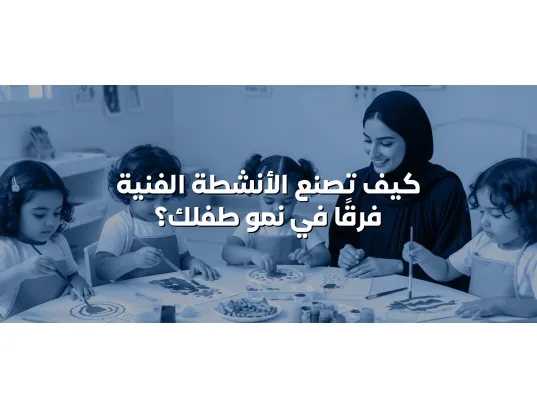The importance of drawing in developing children's skills
Teaching drawing to children is one of the hobbies that it is recommended that parents strive to provide for their children, as drawing encourages the child to increase attention and stimulate skills and creative ability within him. It also helps the child to get rid of stress and make him think well, so it is important to motivate the child to perform the identity of drawing through Enrolling in an education center, and this is what we explain in our article.
Benefits of teaching drawing to children
Children learning to draw brings great benefits to their personalities, as it helps develop their mental abilities. Below we explain the most important benefits:
Motor skills
Drawing helps the child use his hands quickly and strengthens his bones.
Visual analysis
The child begins to strengthen his concentration while drawing, and he can also analyze the things he draws through the process of observation.
Strengthen concentration
Learning to draw is one of the things that a child feels fun in, as it strengthens the child’s ability to focus on precise matters.
Coordination
Drawing helps the child coordinate the things in front of him, as he is keen to use his sense of sight strongly.
Increase the child's confidence
Drawing makes the child very confident in himself, as he displays the drawings he presents to others and receives great support from them.
Developing the creative side
Drawing is considered one of the good things that helps develop a child's creative skill, as he can express what is inside him in the form of wonderful drawings.
What are the basics by which a child learns drawing?
Teaching children drawing requires them to be familiar with the basics, as they are the main element that makes them able to draw and develop their visual perception and attention skills, including the following:
Using a pen
The child learns how to use a pen, as drawing requires a specific grip so that the child can draw correctly.
Determine the space
The child learns how to recognize the elements on the board so that he can exploit the space available to him.
Discrimination
The child recognizes objects through inspection and sight, then distinguishes them by drawing them.
Exercises
The child should be made to practice drawing and apply drawings by imitating the images he sees.
Stages of teaching children to draw
Teaching drawing to children is one of the things that helps develop the child’s attention and sensory perception, as he can express what he is thinking through it, and among the most important basics by which the child learns drawing are the following:
The first stage
In it, the child learns the basics of drawing, learns about the tools he uses, and then begins successively imitating the pictures he sees.
The second phase
The element of imagination is enhanced at this stage, as the child begins to imagine the things he is thinking about, and then draws them.
third level
At this stage, the child has reached professionalism, as he can draw in a distinctive and wonderful way.
When does a child start learning to draw?
Many mothers wonder what is the appropriate age to teach drawing to children, and below we explain when a child begins learning drawing:
From 2 years to 3 years
A child at this age can draw randomly with a pencil.
From 3 years to 5 years
At this age, the child is able to draw simple elements such as geometric shapes and use drawing tools.
From 5 years to 9 years
The child begins to draw various elements and imitate some simple things, and also uses colors.
From 9 to 11 years
The child can use the skill of analysis and visual perception in order to draw in a distinctive way.
How do I encourage my child to draw?
Parents play an important role in teaching a child to draw, as they can motivate their child to draw through many ways, for example:
Drawing center
It is possible for the child to participate in a center specialized in teaching drawing to children, such as the Future Entity Center.
Link drawing to activities
For example, you can go with the child to the park and take his tools with him, where he can draw the nature around him and breathe the open air.
Rewards
It is preferable to encourage the child by buying gifts that motivate him to draw, for example a package of colors.
Drawing location
It is recommended to allocate a place for the child to stay and draw, as his mind will be clear in this place.
Drawing space
A large wooden blackboard can be provided on which the child can draw and have plenty of space for drawing, unlike paper.
Child participation
It is preferable for you to involve your child in drawing and encourage him to show his creative spirit.
Future Kayan Center develops your child's skills in drawing and reading
Future Kayan Center can offer drawing education to children, as the child will have great fun learning at the center, as the center is keen to provide many strategies to children during the learning stage, for example:
Motor skill
The center works to enhance the child’s motor skills by helping him coordinate the movement of his eyes and arms while drawing.
creativity
The center encourages children to draw, use their memory to imagine, and then express their imagination through drawing.
Cognitive development
The center works to highlight the child's cognitive skills by enhancing the child's analysis and observation.
the focus
The center enhances the child's concentration by teaching him the basics of drawing and concentration.
Building confidence
The center ensures that the child feels confident through drawing, as he finds in drawing a source of creativity.
Critical thinking skill
The center enhances the child's critical thinking skill by drawing and releasing the energy inside him.
Therefore, Kayan Al-Mustaqbal Center is considered one of the best accredited centers that can be relied upon to teach drawing to children, as it provides the best plans that help the child learn drawing in a short time.
-resized.webp)
-resized.webp)

